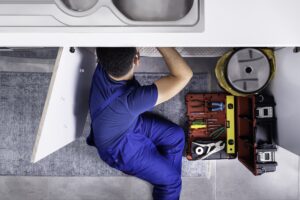Maybe you have heard of hard and soft water before. If you know the difference between hard and soft water, then you know that hard water can be dangerous for your plumbing. But, there’s also a good chance that you are unfamiliar with these terms.
Either way, you can keep reading to learn more about hard water and the risks that it poses for your plumbing system. Then, give our team a call for a water softener in Warren, NJ, if you’re having any of the problems listed below.
What is Hard Water?
To put it simply, hard water has higher mineral content than soft water. There are various levels of hard water. The higher the level of hard water rating, the more minerals like calcium and magnesium that are present in your water. If you pour a glass of water from your sink, you may not even be able to see these minerals because they are so tiny. But, they can still have a major impact on your plumbing over a period of years.
Risks of Hard Water
Minerals from hard water can build up slowly to create a sediment layer in your plumbing system. Since calcium and magnesium minerals are very abrasive, they can wear down pipe surfaces. Even though you may think of your plumbing fixtures as being sturdy enough to last for decades, hard water can shorten that lifespan.
Potential for Leaks
As plumbing surfaces wear down, they are more likely to leak. The minerals in hard water can make plumbing connections less secure and even wear down pipes to the point that they even develop holes. The problem with corrosion is that once it begins, it can speed up quickly without a way to repair it. Any plumbing fixtures affected need to be completely replaced.
Hot Water
Sediment from hard water can also build up inside of water appliances like your water heater – whether tank or tankless. In a tank water heater, you don’t just have to worry about corrosion. Minerals can block heating elements so that your water stops getting as hot as it once did. You’re likely to notice a decrease in hot water that happens slowly over time until it’s an obvious problem.
This can happen even faster in a tankless water heater since all of the connections are smaller and more compact. The good news is, our team can flush our your water heater and get it back to working great again. During the flush, we can also assess the inside of your water heater to see if minerals have begun to corrode the inside lining.
Water Appliances
The problem with hard water extends beyond your plumbing fixtures. Hard water can also damage your water appliances like your dishwasher and clothes washer. These appliances may begin to not produce the same results that you once enjoyed. Clothes and dishes may begin to come out with unusual stains and still have dirt and grime present even after a wash cycle.
Keep in mind that you can flush out your plumbing system and clean away minerals, but the problems will only continue unless you stop hard water at the source. Our team can install a water softener so that minerals get filtered out before water ever enters your home. It’s a great investment that can protect your plumbing, water heater and other water appliances, too.
Contact Schaible’s Plumbing & Heating Inc. to schedule an appointment for air conditioner services that get the job done.

